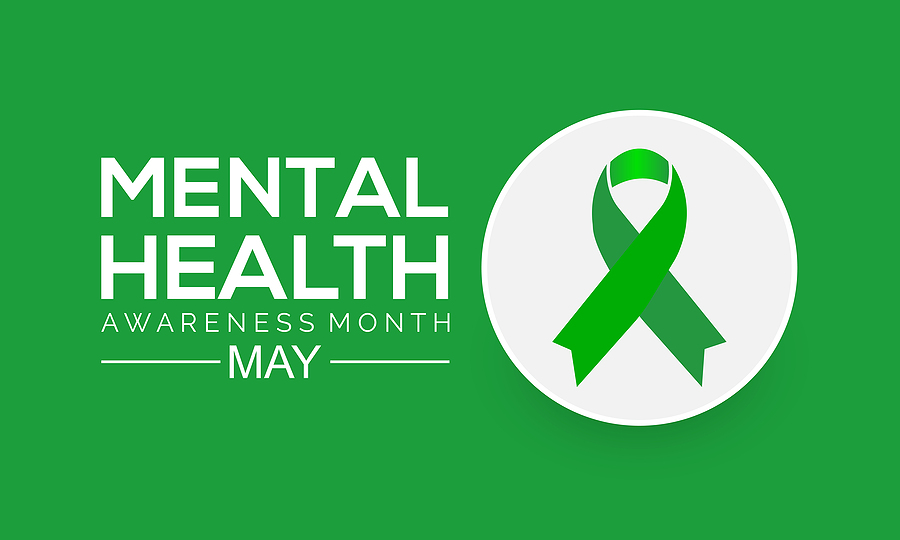If you didn’t know, May is Mental Health Awareness Month. Mental health has been gaining more attention and recognition in recent years. With the rise of mental health conditions, such as depression and anxiety, it’s essential to raise awareness for these illnesses and promote mental health as a vital part of overall wellness.
Hence, May has been designated as Mental Health Awareness Month to spread awareness and reduce stigma around mental health issues. In this blog, we explore the importance of Mental Health Awareness Month and why it’s more crucial now than ever.
Understanding the Prevalence of Mental Health Issues
According to recent studies, one in five adults experience mental health issues, while one in six youths aged 6-17 experience a mental health disorder each year. These staggering numbers highlight the importance of mental health awareness and advocacy. Mental health is essential for overall wellness, and it is crucial to increase awareness to promote early detection and intervention.
Fighting Stigma
Increasing awareness around mental health challenges also means standing up against stigma and discrimination. It is still not uncommon for people to face discrimination and judgment from others due to their mental health challenges. It is more crucial than ever to promote acceptance, compassion, and empathy towards people who are struggling with their mental health.
Promoting Early Intervention
One of the essential goals of Mental Health Awareness Month is to raise awareness about early intervention. Early diagnosis and treatment of mental health conditions can make a significant difference in a person’s recovery and quality of life. Mental health awareness can help people recognize symptoms in themselves or others and seek appropriate behavioral health care when needed.
Advocating for Better Mental Health Care
Mental Health Awareness Month provides opportunities to advocate for better mental health care policies and resources. Despite the prevalence of mental health challenges, mental health resources and treatment options are still insufficient in many communities. Advocating to expand access to resources, support, and treatment is critical for improving the overall health and mental health outcomes for all individuals.
Looking for an experienced Wordpress Development company?
Understanding the Different Types of Mental Health Conditions
Mental health conditions can affect anyone, regardless of age, race, gender, or background. At some point in our lives, we may experience feelings of sadness, anxiety, or stress. But sometimes, these emotions can intensify and turn into more serious mental health conditions that require professional help.
Anxiety Disorders
Anxiety is a natural response to stress, but when it becomes excessive or prolonged, it can interfere with daily life. Anxiety disorders include conditions such as generalized anxiety disorder, panic disorder, social anxiety disorder, and obsessive-compulsive disorder. Symptoms may include excessive worrying, panic attacks, or compulsive behaviors.
Treatment typically involves therapy, medication, lifestyle changes, and self-help strategies such as mindfulness, exercise, and stress management techniques.
Mood Disorders
Mood disorders are a group of mental health conditions that affect a person’s emotional state. These conditions include depression, bipolar disorder, and seasonal affective disorder. Symptoms may include sadness, hopelessness, low energy, and changes in sleep or appetite.
Treatment for mood disorders may include medication, psychotherapy, and lifestyle changes such as exercise and healthy eating.
Personality Disorders
Personality disorders involve long-term patterns of thinking, feeling, and behaving that deviate from social norms. These conditions include borderline personality disorder, narcissistic personality disorder, and antisocial personality disorder. Symptoms may include emotional instability, impulsivity, fear of abandonment, and difficulty in relationships.
Treatment for personality disorders may include therapy, medication, and in some cases, hospitalization.
Psychotic Disorders
Psychotic disorders involve a loss of touch with reality, such as hallucinations or delusions. These conditions include schizophrenia, schizoaffective disorder, and delusional disorder. Symptoms may include hallucinations, delusions, disorganized thinking, and unusual behaviors.
Treatment for psychotic disorders may include medication, therapy, and support from family and friends.
Eating Disorders
Eating disorders involve extreme emotions, attitudes, and behaviors related to food and weight. These conditions include anorexia nervosa, bulimia nervosa, and binge-eating disorder. Symptoms may include a distorted body image, unhealthy weight loss or gain, and dangerous behaviors such as purging or binging.
Treatment for eating disorders may include a combination of therapy, medication, and nutritional counseling.
Mental Illness Can Affect Anyone
Mental health conditions are complex, and each individual’s experience is unique. If you or someone you know is struggling with a mental health condition, know that help is available. There are numerous treatment options, including therapy, medication, and lifestyle changes, that can help manage symptoms and improve overall mental well-being.
Remember, it’s okay to ask for help. Taking care of your mental health is just as important as taking care of your physical health. So, don’t hesitate to reach out to a mental health professional or support group if you need it. You deserve to live a fulfilling and happy life, and seeking help is the first step towards achieving that goal.
Understanding the Symptoms of Mental Illness
Mental illness is a condition that affects many people around the world. It refers to a wide range of disorders that affect an individual’s thoughts, emotions, and behavior. Identifying the symptoms of mental illness can be difficult, as people may experience different symptoms and at varying degrees. However, understanding the common symptoms of mental illness can help people seek appropriate treatment and support.
Changes in Mood
One of the most common symptoms of mental illness is changes in mood. People with depression, bipolar disorder, and other mood disorders may experience extreme sadness, irritability, or mood swings. They may lose interest in activities they once enjoyed or have difficulty sleeping. If you or someone you know is experiencing any changes in mood that are affecting everyday life, seek professional help.
Unexplained Physical Symptoms
Many people with mental illness also experience unexplained physical symptoms such as headaches, stomach aches, or fatigue. These symptoms can often be related to anxiety or stress and may be caused by the body’s response to difficult situations or trauma. Seeking medical advice can help to rule out other physical conditions and ensure the right treatment is prescribed.
Changes in Behavior
People with mental illness may have difficulty concentrating or making decisions. They may also withdraw from social situations, become increasingly isolated or lose interest in work or other activities. In severe cases, they may develop suicidal thoughts or tendencies. If you or anyone you know experiences these symptoms, it’s important to talk to a mental health professional or seek emergency help.
Changes in Thought Patterns
Mental illness can also affect a person’s thought processes and the way they perceive reality. They may experience hallucinations, delusions, or abnormal thoughts that affect their ability to function normally. People with schizophrenia or other psychotic disorders may experience these symptoms, which can be very distressing for them and those around them.
Substance Abuse
Many people with mental illness may also struggle with substance abuse. This can be a way to self-medicate or cope with the symptoms of their illness. It’s important to understand that using drugs or alcohol can exacerbate underlying mental health problems and make them more difficult to manage. Seeking help for substance abuse and mental health disorders together is imperative for long-lasting recovery.
Why Suicide Prevention should be a Priority in Mental Health Awareness Month
May is Mental Health Awareness Month, which means that it is the perfect time to start a conversation about suicide prevention. Suicide has become a global public health issue. According to the World Health Organization, around 800,000 people die by suicide every year. In the United States, suicide is the 10th leading cause of death. It’s time to take action. Suicide prevention is a crucial aspect of mental health awareness and should be a priority in our efforts to support individuals struggling with mental health.
Understanding Suicide
The first step to preventing suicide is understanding it and increasing access to education. Suicide is a complex issue that is often caused by a combination of genetic, environmental, and mental health factors. Suicide is not caused by weakness, and it’s important to recognize that patients who experience suicidal thoughts are not looking for attention. Understanding that suicide is a real issue that can affect anyone is crucial to breaking down stigmas and stereotypes that often surround mental health.
Identifying Risk Factors
To prevent suicide, we must be able to identify those at risk. Some of the more common risk factors for suicide include mental illness, substance abuse, previous suicide attempts, and access to firearms. By recognizing these risk factors, we can take proactive measures to help those at risk seek treatment and support.
Intervening Early
It’s essential to intervene early when suicidal thoughts or behaviors are present. Identifying signs of depression, hopelessness, or suicidal ideation can be challenging. However, it’s critical to not ignore potential warning signs. Getting help early can make all the difference in preventing suicide. It’s vital to provide support and treatment as soon as possible with people with serious mental illness.
Encouraging Dialogue
We need to continue encouraging open and honest dialogue surrounding suicide. It’s important to create a safe space for individuals to speak out about their struggles, mental health challenges, and suicidal thoughts. We must equip people with the tools and resources needed to identify warning signs, intervene when needed, and connect those at risk to critical support networks.
Creating a Support Network
Finally, we need to create a strong support network for those struggling with mental health challenges. Feeling isolated and alone can exacerbate mental health issues and suicidal thoughts. Improving access to mental health resources and support networks is crucial in preventing suicide. Having a strong network of friends, family, and healthcare professionals can go a long way in providing support and understanding.
Joshua York Legacy Foundation
Mental Health Awareness Month is the ideal time to start a conversation about suicide prevention. Suicide is a complex issue, but there are steps we can take to prevent it. Understanding suicide and identifying risk factors is important to proactive interventions. Encouraging open dialogue and creating support networks for those struggling with mental health challenges is crucial in breaking down stigmas and providing hope. It takes all of us to make a difference. Let’s work together to prevent suicide and support those struggling with mental health challenges. Reach out to the Joshua York Legacy Foundation to find a way to help your loved ones suffering from suicidal ideation.
Conclusion
Mental Health Awareness Month is more important than ever, given the challenging times we are living in. It’s a time to increase awareness, fight stigma, promote early intervention, and advocate for better mental health care policies and resources.
We must prioritize our mental health and well-being, and by increasing awareness and promoting access to resources, we can make a difference in the lives of those struggling with mental health challenges. Let’s continue to educate ourselves, our families, our colleagues, and others on the importance of mental health, and come together to support individuals in our society in need!
Business Owners Need Mental Health Awareness Too!
Are you a business owner struggling to build your brand and reach your target audience? Our team at Priceless Consulting LLC is here to help. With our expertise in web development, marketing, and consulting, we can assist you in creating the perfect branding strategy to give your business the boost it needs.
However, while building your brand may be a top priority, it’s equally important to prioritize your mental health. May is mental health awareness month, and it’s crucial to remember to take care of yourself as you work towards your business goals. Our team understands the challenges that come with being a business owner, and we encourage you to take breaks and prioritize your mental well-being. Let us help you build your brand while also ensuring you’re taking care of yourself.








